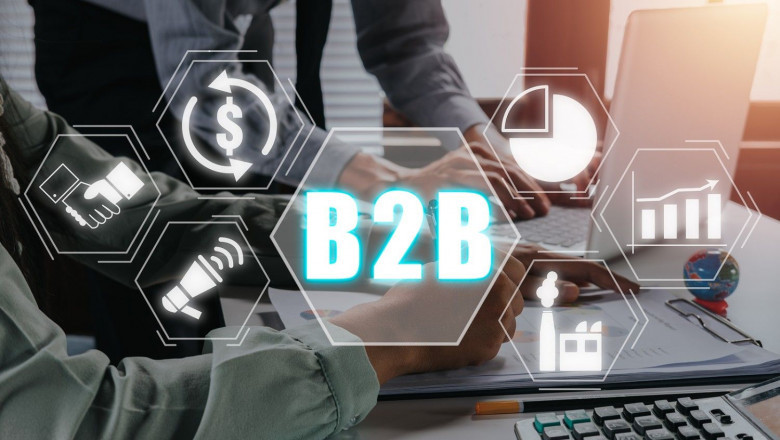views
B2B payment platforms are revolutionizing corporate financial transactions by enabling faster, more efficient, and secure digital payments. Here’s how.
Are you amazed by the speed of transactions with digital payments, where even cross-border payments are settled in near real-time? But did you know that real-time payments aren’t a new phenomenon? Surprised? Japan was the first country to launch a real-time bulk settlement service in April 1973 with Zengin, which operated only on working days, during business hours. It has taken 50 years for real-time payments (RTP) to become mainstream. As of 2023, over 70 countries supported RTP, although B2B transactions are still catching up with the latest payment platforms. In fact, according to the Federal Reserve, US-based businesses recorded $8.9 trillion worth of payments via paper-based checks in 2023, while many B2B ACH payments were still being processed only at the end of the business day, taking 2-3 working days to be settled. Plus, complexities, time, and costs increase when these B2B payments are cross-border.
Businesses of all sizes should capitalize on the rapid advances in B2B payment processing because the benefits go far beyond real-time settlement.
Stay ahead of the competition by keeping up with the rapidly evolving payments landscape.
Learn more in our blog: Top 6 Trends Shaping Enterprise Payment Solutions in 2025
Benefits of B2B Payment Solutions for Corporate Transactions
89% of small to mid-size businesses say that delayed payments are a major hurdle to growth.
Real-time payment processing brings transparency to the otherwise unpredictable and fragmented B2B transactions landscape, apart from supporting expansion into new markets and geographies. The incoming ISO 20022 messaging standard will give access to significantly richer transaction data, which can be used to gain strategic insights and ensure end-to-end modernization of B2B transactions. Adopting a powerful B2B payment platform could especially benefit small and mid-sized organizations by offering greater transaction visibility, lowering payment processing costs, minimizing manual invoicing and processing of accounts payables, and eliminating payment delays. And the benefits don’t stop here.
Greater Cash Visibility
With real-time transaction settlement, working capital is freed up, decreasing the need for businesses to maintain huge monetary buffers. Plus, instant payments give you the flexibility to make and receive payments closer to the due date. You also have access to real-time transaction reporting and account balance data, which enhances cash visibility. Deloitte’s “conservative growth scenario” is that RTPs could replace $18.9 trillion in ACH and check-based transactions in the US by 2028.
Cost-Savings and Operational Efficiency
Traditional payment methods involve numerous steps, including manual processing, which makes them not just time-consuming but also error-prone. Modern B2B payment solutions help automate much of the process, eliminating these hurdles and increasing operational efficiency. For instance, invoices and reminders can be automatically generated and sent. This accelerates the payment cycle while freeing up manpower and resources for more strategic business activities. Such solutions are also more cost-effective than paper-based methods. Your organization can not just save on late payment fees but also get discounts on early payments, while improving cash flow management.
Improved Customer and Third-Party Vendor Relationships
Streamlined payments have a positive impact on both vendor and customer relationships. You can build and sustain trust by ensuring accurate and timely payments with a B2B payments platform. This can foster long-term relationships and even help negotiate favorable terms, such as discounts or better credit terms. On the other hand, when customers are satisfied due to convenient payments, they are likely to remain loyal to your business and make repeat purchases. Plus, transparency allows all parties to track transaction statuses in real-time, minimizing the risk of misunderstandings and disputes.
Fraud Prevention and Compliance
The right platform can transform payments into strategic elements of your business model, preparing your organization to deal effectively with an increasingly interconnected and global financial ecosystem. Through tokenization, end-to-end encryption, and more, every transaction is protected from initiation to settlement. With an experienced technology partner, you don’t even need to worry about updating the platform. They will ensure that the security mechanisms can cope with new and emerging threats. Also, your B2B payment processing will be compliant with data privacy and security regulations across jurisdictions.
Integrating the Right B2B Payment Solution
The key to adapting with agility to dynamic market demand depends on integrating the right technology solutions into your existing ecosystem. This is also true of adopting the latest payment technology. With the best-fit B2B payment platform, you can offer your partners and customers the convenience of making payments via their preferred mode while ensuring speed and security. Here’s a look at what to keep in mind while choosing the platform.
Easy Integration
The B2B payment processing technology should integrate seamlessly with your existing tech stack. With the right technology partner, you can ensure a smooth transition with minimal business disruption, optimal support for employee training, and ongoing technology support after deployment.
Scalability
Make sure the platform offers scalability on demand, powering your organization to handle peak transaction volumes as smoothly and quickly as low volumes without the need for additional resources or effort from your end.
User Experience
A user-friendly and intuitive interface makes the solution convenient to use for both your employees and your customers. It should offer a customizable dashboard, easy addition or removal of payment methods, and access to data analytics and reporting.
Strong Security
Check the security features offered by the platform, such as tokenization, encryption, access controls, and compliance with regulations, including PCI DSS. Security is crucial for corporate transactions, since sensitive data will be transmitted over the payment rails.
Read More: How B2B Payments Platforms are Transforming Corporate Financial Transactions














Comments
0 comment